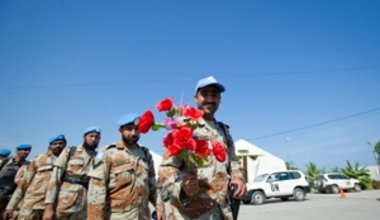SRSG's speech on Launching Ceremony of the “2009 Community Elections Women Participation Booklet”
Dili, 05 July 2010 - Speech by the Special Representative of the Secretary-General for Timor-Leste and Head of UNMIT, Ms. Ameerah Haq
Launching Ceremony of the "2009 Community Elections Women Participation Booklet" and the final results of 2010 Voter Registration
His Excellency President of the Republic
Excellency President of the Court of Appeal
Excellency Minister of State Administration and Territorial Management
Excellency Chairman of the CNE
Excellency STAE Director
Distinguished guests and participants
Hau nia respeitu ba convidadus tomak,
I would like to start by congratulating STAE for the initiative to produce the booklet on women participation in elections, and also for successfully completing the 2010 Voter Registration exercise. I also commend the efforts of CNE and our UN Electoral Support Team.
Historically, the participation of women in politics has been low. In many countries and in democracies that emerged across the world women had to fight to win the right to vote, or to run for public office, until as recently as two decades ago. Even then, the participation of women in decision-making bodies remained low, and the increases in the rate of women representation slow.
I wish to commend the people and leaders of Timor-Leste, however, for moving fast to ensure that women actively participate in the electoral process and not just as voters, but also as candidates for various positions in the political system at all levels.
The goal of enhancing the participation of women in political life and ensuring equal enjoyment of political rights, including the full participation in elections is enshrined in the Universal Declaration of Human Rights and the major international human rights instruments. Promoting equality and empowering women is also one of the Millennium Development Goals. Increased participation in political life will ensure that women are able to contribute to the development of a more peaceful and stable society.
It was the Convention on the Elimination of All Forms of Discrimination Against Women (CEDAW), which came into force in 1979, that paved the way for more positive actions by States to address gender imbalance in decision-making. Electoral quotas were sanctioned through national constitutions or legislations, such as voluntary inclusion of women in electoral lists of political parties or compulsory reservation for women of a number of seats in national parliaments.
On 16 April 2003, Timor-Leste ratified CEDAW without reservations and became a State Party. Mandated by CEDAW, temporary special measures were meant to address the historical and cultural roots of gender inequality, and remove other obstacles that keep women from participating in politics on a basis of equality with men. Further to the non-discrimination clauses and an undertaking by the State to promote equality between men and women, the Timorese Constitution also states that women and men's full participation is an essential feature of democracy.
We applaud the Timor-Leste National Parliament and the Government for adopting affirmative action policies in the recent Community Elections through the special reservation of seats for women. In the context of the Community Elections, these special measures (electoral quotas for women), were established to facilitate the equal enjoyment of political rights of both women and men. Seats were reserved for women and youth in the suco councils by law. These provisions resulted in a large number of women elected in the village councils (28%), among the highest in the region for community leaders.
That said we should note that the number of women winning seats opened to be contest by either sex remains very low. In 2004/2005 community elections seven women were elected Chefe de Suco. This number only improved marginally in the 2009 community elections and we now have ten women Chefe de Suco out of a total of 442. I would like to take this opportunity to congratulate the women chefe de Suco present here today.
The high turn out of women voters in the 2009 Community Elections was very encouraging and largely due to a systematic voter education program targeting potential women voters. The UN worked together with STAE and CNE in Civic and Voter Education campaigns aimed at targeting women as critical actors for the success of the electoral process
Simultaneously, the trainings given to polling staff and observer groups were intended to give the participants a comprehensive grasp of the electoral law and history of Timor-Leste with particular focus on gender and elections.
With this booklet STAE draws attention on some aspects of women participation in the 2009 electoral processes and, by this, encourages them to participate with dignity and respect in future decision making activities. I encourage all stakeholders to take note of the recommendations in the booklet in order to facilitate increased women participation in electoral process in Timor-Leste in future.
Let me again reiterate my appreciation to STAE for the 2010 Voter Registration update targeting elder women in remote areas. Registration of voters represents an opportunity for women to be re installed in a process from which they have been excluded earlier. The results announced today show that almost 50% of the registered voters are women. This registration exercise presents a fresh opportunity for women to become part of a national database, obtain documents and – more importantly – gain a sense of citizenship.
Finally, I would like to reiterate the commitment of the UN to continue the support and assistance to STAE and CNE in the consolidation of the electoral system towards building a peaceful and democratic society.
Obrigado Barak!
 UN
UN United Nations Peacekeeping
United Nations Peacekeeping



